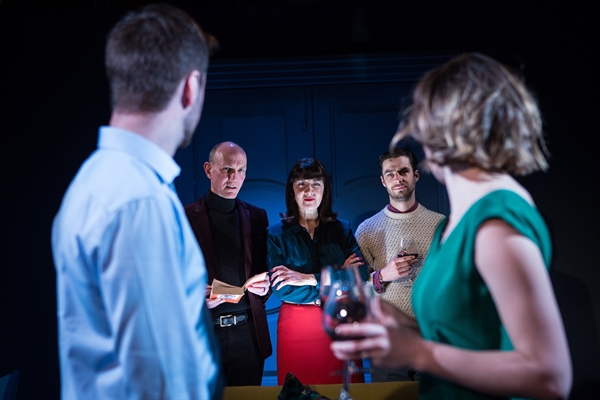@ Traverse Theatre, Edinburgh, until Sat 7 May 2016
Neighbours from hell come in many varieties. In French-Canadian writer Catherine-Anne Toupin‘s play, directed here by Michael Boyd in a Traverse/Bush Theatre/Theatre Royal Bath co-production, turning up uninvited to comment on the decor is the least of it. Her twisted trio of mother, father and son, with their psychological destructiveness, creepy sexual tastes and sinister flamboyance, owe more to League of Gentlemen than Victor Meldrew. It makes for a comically grotesque eighty minutes, but a frustrating one, which seems more concerned with its own warped trajectory than with working with the audience towards a resolution.
Ben (Sean Biggerstaff) and Alice (Lindsey Campbell) are a young couple who have moved into a new apartment block. Although superficially perfect, they cohabit with an unspoken sadness, signified by the offstage cries of a baby. It proves all too easy for their neightbours to drive a wedge between them by probing into their past lives, offering glances up their skirt (Juliette – Maureen Beattie), leering and groping (Gilles – Guy Williams) or rolling up their trouser legs to “look at my scars!!” (Francois – Dyfan Dwyfor).
Biggerstaff and Campbell frequently find themselves playing the straight (wo)man to Beattie and Williams, and do so very effectively. The older couple give the play its flavour though, both pitching the suburban weirdness at just the right level. Dwyfor has a difficult job – son Francois is usually forced into a sulky role outside of the main action – but he brings a very enjoyable hint of Leonard Rossiter in comedy breakdown mode to proceedings.
The couple’s apartment is very Frasier, and though instinctively one feels Scotland and Canada share certain sensibilities, French Canada, as seen here, has less in common. That cultural hybrid comes across – a very French approach to relationships, a very North American one to living arrangements. Delivered in Scottish accents, it remains a work with a foreign tone.
It’s an idiosyncratic watch for other reasons too. The progression, or should that be descent, of the play is uneven. With the first arrival of Juliette, it suddenly judders from a sequence of mournful opening scenes with Ben and Alice, into the deviant heart of the play. That comic shock serves a purpose, alerting us to the destructive force about to enter the play. But after the next shock, a climactic scene (in several senses), which signifies the play’s departure from (a kind of) reality into ever more surreal situations, the play’s narrative disintegrates. It now feels ready to end at any point, simply when the writer runs out of strange scenes to paint.
Taste will divide audiences on this, more than with most plays. Many in tonight find it uproarious, but while it shares many tropes with TV sitcoms, the laughs aren’t easy ones. And on closing, it’s the characters that linger in the mind, rather than any defining statement. Right Now says more about the dark recesses of the writer’s mind than anything universal about humanity.


Comments